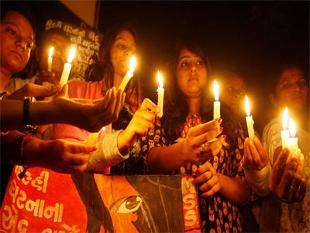 New Delhi, Dec 16: Under severe attack after the December 16 gangrape, Delhi police took a slew of steps like setting up helplines and women help desks at police stations to ensure women's safety but there is no let up in the crimes against them which have actually increased during the period.
New Delhi, Dec 16: Under severe attack after the December 16 gangrape, Delhi police took a slew of steps like setting up helplines and women help desks at police stations to ensure women's safety but there is no let up in the crimes against them which have actually increased during the period.
The number of rape cases this year is highest in the last 13 years, but Delhi police has attributed it to greater awareness and registering of cases which otherwise would have gone unreported.
According to Delhi police data, a total of 1,493 cases of rape were registered in the national capital till November 30 which is more than double the number of cases registered in the same period in 2012.
What is more alarming is that the number of cases of molestation has registered a five-fold increase as till November 2013, a total of 3,237 such cases were registered as against 625 last year. Cases related to outraging the modesty of women, that includes eve-teasing and stalking, also show a similar trend with the figure skyrocketing to 852 from last year's 165.
As per data of National Crime Record Bureau (NCRB), in 2012, a total of 706 rape cases were registered while in 2011, the numbers of registered rape cases were 572, as against 507 rape cases reported in 2010.
The figure stood at 469 in 2009. In 2008, the figure was 466, while in 2007, 2006, 2005, 2004, 2003, 2002, 2001 the figures were 598, 623, 658, 551, 490, 403 and 381 respectively.
However, Delhi police terms it as a good sign that now more cases are being registered which mean that more women are coming forward and reporting the crimes which probably was not the case earlier.
According to a senior police official, "The rise in the number of reported cases means that now women are coming forward and reporting such incidents. Earlier, a number of cases went unreported as women were afraid of contacting police and also the social stigma which came with it.
"Today, complaints are recorded verbatim and FIRs are filed simply on the basis of women's complaint without raising any issue. This has caused significant rise in the number of registered cases but we are not deterred by it," he said.
Police have set up women help desks at police stations functional round-the-clock, increased lines of police helpline '100' from 60 to 100 and were registering cases anywhere in the capital without bothering about jurisdiction.
A 'Crime Against Women' Cell has been established for redressal of complaints and grievances of women in distress. Four women's helplines are currently operative and one Women's Post Mail is functional dealing exclusively with complaints from women. An all-women police mobile team has been made functional round-the-clock.
Women officers are now primarily investigating rape cases. Orders have been issued to ensure immediate registration of FIRs in cases of crime against women and efforts are made to file charge sheet against the accused within three months.
Patrolling has been increased, especially at night and on routes taken by BPO vehicles ferrying women. The number of PCR vans has also been increased. Currently, around 850 PCR vans are patrolling streets of the national capital and they are a vital cog in ensuring women's security, according to Delhi police.
They have been deployed outside girls' schools and women's colleges. 24-hour police cover has also been ensured around entertainment hubs like malls and cinema halls with heightened vigil from 8 PM to 1 AM. A woman can also dial 100 and get dropped home at night by a PCR van if she is stranded somewhere.






Comments
Add new comment